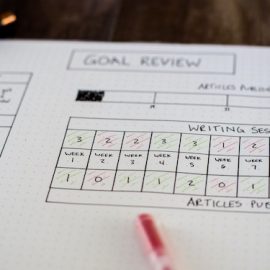

This article is an excerpt from the Shortform book guide to "So Good They Can't Ignore You" by Cal Newport. Shortform has the world's best summaries and analyses of books you should be reading.
Like this article? Sign up for a free trial here .
Are you familiar with the “deliberate practice” method of improving your skills? How this can help you build career capital and get a job you love?
When you improve your skills—especially scarce and valuable skills—you build up career capital that you can use to “buy” a desirable job. The best method of improving your skills is deliberate practice. There are five steps to figuring out how to deliberately practice in your workplace.
Read more to learn this method of improving your skills.
How to Improve Your Skills: Practice Deliberately
As we learned in the previous section, to develop your career capital, you need to adopt the craftsperson mindset and practice your skills in order to develop them. The best way to practice is “deliberately,” a method studied by psychologist Anders Ericsson.
(Shortform note: To learn more about Ericsson’s research, read our summary of his book Peak: Secrets from the New Science of Expertise.)
There are two requirements for deliberate practice:
Requirement #1: Appropriate challenge. You need to push yourself beyond your comfort zone. Repeating things you’re already good at is fun, but it doesn’t make you improve.
- Bad example: When the author practiced guitar, he didn’t like the mental strain that came with learning new songs, so he mainly spent his practice time playing through songs he was already good at.
- Good example: When Jordan Tice, a professional musician, was first learning guitar, he learned Allman Brothers songs by listening to them, which is more difficult than learning them by reading music. He also plays everything a little faster than is comfortable in order to make things hard for himself.
Requirement #2: Immediate feedback. You need to be told what you’re doing right and wrong in order to improve. Feedback can come from a teacher, coach, yourself, or the result of your actions.
- Good example: Jordan Tice studied with a guitar teacher who would tell him whenever he made a mistake. He also got feedback from his guitar—he could hear it when he played a wrong note.
Productivity and getting things done isn’t the goal of deliberate practice. The goal is to improve your skills.
Extended Example: Chess Players
Neil Charness, a psychologist, studied how chess players practice to see if different practicing methods made a difference to their skill level. Charness only looked at people who had acquired 10,000 hours of practice, a number generally agreed upon to be the amount of time required to become an expert. (This time requirement suggests that becoming an expert has less to do with natural talent and more to do with effort. Scientists haven’t found that experts have a natural predisposition towards their fields, except that physical characteristics like being tall might make you better at basketball.)
Of the players who had 10,000 hours of practice, some had achieved the rank of grandmaster and others were at an intermediate level. Since they all had the same amount of experience, there must have been another factor that determined who became an expert and who didn’t progress and stayed intermediate.
At the time, there was a debate among chess players about which of two practice methods was most effective. The methods were:
- Playing in tournaments, which forced players to adhere to a time limit and deal with distractions.
- Reading books and training with coaches, which forced players to identify their weaknesses and then train to overcome them.
Charness discovered that seriously studying the game was far more effective than any other practice method. The people who became grandmasters had spent half of their 10,000 hours on serious study. The people who stayed intermediate had spent only 10% of their time on serious study.
This is because playing in tournaments doesn’t offer an appropriate challenge, the first ingredient of deliberate practice. In a tournament, chess players often aren’t evenly matched against their opponents. Face off against a far more skilled opponent than you and you won’t be challenged, you’ll be destroyed. Face off against a far less skilled opponent and you won’t be challenged because winning is too easy.
Serious study, on the other hand, is tailored to your skill level at any point in time. As you improve your skills, you can adjust your study to make it more challenging. Additionally, serious study also offers the second requirement of deliberate practice, immediate feedback. You can look up how to solve a chess problem if you can’t figure it out by yourself, or if you have a coach, she can tell you what you’re doing wrong.
Applying Deliberate Practice to the Workplace
If you’re not playing chess, music, or a sport, it’s less obvious what deliberate practice involves—the workplace doesn’t have a strict competition schedule or training regime. As a result, most professionals improve their skills for a little while and then get caught in plateaus. Ericsson discovered that after reaching an acceptable performance level at work, people’s skills didn’t improve with additional practice time.
This means that if you can be one of the first people to figure out how to apply deliberate practice in your field, you’ll quickly acquire more career capital than your coworkers and surpass them. We’ll look at how to do this in the next section.
Five Steps to Practicing Deliberately and Improving Your Skills
There are five steps to figuring out how to deliberately practice in your workplace and improve your skills:
Step #1: Determine your career capital market. There are two types of career capital markets:
- Single skill. In this type of market, there’s only one kind of career capital. Everyone who works in your industry is trying to acquire the same skill.
- For example, Alex Berger, a television writer, is in a single-skill market because, in TV writing, the only meaningful skill is scriptwriting.
- Multi-skill. In this type of market, there are different types of applicable career capital. Everyone who works in your industry has a different combination of capital.
- For example, Mike Jackson, a cleantech venture capitalist, is in a multi-skill market because venture capitalism makes use of many skills. The skills Mike has are entrepreneurship and knowledge of renewable energy markets.
It’s less obvious than you might think to determine which market you’re in, and many people mistake a single-skill market for a multi-skill one.
- For example, Alex originally thought that the entertainment industry was multi-skill and worked as an editor at the National Lampoon, anticipating the skills he gained there (working with humor writers) would help him in other parts of the entertainment industry. As the only skill that matters in TV writing is scriptwriting, his skills weren’t transferable. After a year, he realized this and took a job as a TV executive’s assistant, which did teach him the single skill he needed for TV writing.
Step #2: Determine what kind of capital you want to develop. In a single-skill market, you don’t have a choice—there’s only one type of capital—but in a multi-skill market, you can choose which skills you want to develop. It’s fastest and easiest to improve your skills in areas you already have a head start in.
- For example, Mike did his bachelor’s degree in earth systems and biology at Stanford and his master’s thesis was about the natural-gas industry in India. When Mike’s thesis supervisor then launched a research project on natural gas in India, he asked Mike to help. Mike said yes, deciding that the project would help him acquire the career capital of understanding the global energy market. Mike chose this particular type of career capital because the opportunity was easily available to him due to his background.
Step #3: Determine your goals. Once you’ve decided what skill you’re going to develop, you need to decide how good you have to get at it.
- For example, Alex decided that “good” meant writing a script that an agent was willing to take on.
Step #4: Strive for discomfort. Seek out the feeling of mental strain and discomfort to challenge yourself, and also seek out and learn from feedback.
- For example, Mike gives himself feedback by budgeting the hours of each week to certain tasks using a spreadsheet. Then, he tracks his hours throughout the week and at the end of the week, he looks at whether or not he met his targets. This forces him to spend time on the tasks that are challenging and provide feedback, such as fund-raising or talking to investors, and spend less time on mindless tasks such as email.
If you encounter mental resistance to discomfort, such as wanting to give up on your practice session, you can try implementing two types of structure:
- Time structure. Practice for a specified amount of time. Keep practicing for the entire time, even if you feel you’re not making progress. Probably, after a few minutes, your internal resistance will wear down and you’ll be able to concentrate.
- For example, when the author was trying to understand a difficult paper, he forced himself to study it for one hour at a time.
- Information structure. Practice until you achieve a specified result, no matter how long it takes you.
- For example, the author quizzed himself on the important definitions in the paper. He wasn’t allowed to stop practicing until he’d memorized the definitions, no matter how long it took.
Step #5: Stay focused and exercise diligence. In this context, “diligence” refers to focusing on developing the skill you’ve chosen and not being distracted by other pursuits. It takes a long time to develop a skill, so you need to stick with it.
- For example, it took Alex two years to get his first TV script produced, and it took Mike five years after graduating from college to land his job as a cleantech venture capitalist.
When you improve your skills, you increase your chances to get a job you love.

———End of Preview———
Like what you just read? Read the rest of the world's best book summary and analysis of Cal Newport's "So Good They Can't Ignore You" at Shortform .
Here's what you'll find in our full So Good They Can't Ignore You summary :
- What makes people love their work
- Why following your passion is not the path to loving your work
- The four rules for loving your work






